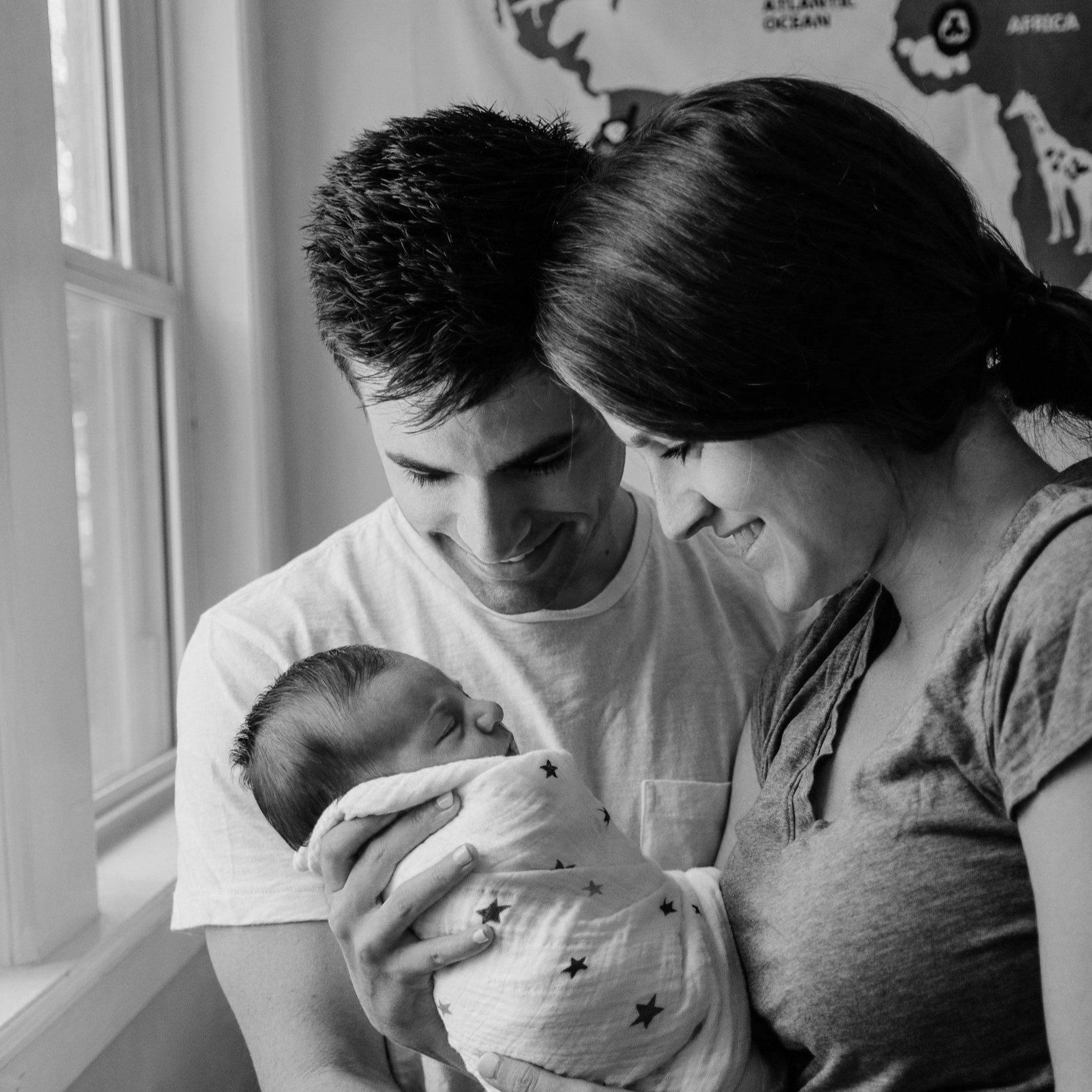5 tips for new parents drifting apart
You bring a beautiful baby into the world and expect to enjoy the expansion of your family. Maybe you do in some ways, but what might hit you unexpectedly is how much your marriage or partnership can change. This new, bigger family looks different than you imagined. There’s more fighting, resentment, and some fear that your marriage or relationship might not make it.
Firstly, relationship struggles after having a baby is normal. People prepare less than they should for the realities of caring for a newborn, and then an infant, and toddler. You don’t know what you don’t know, however. With the amount of change this new child can bring, adjusting to a new normal not only as a parent, but as a partner, can be really difficult.
As a parent and therapist who provides therapy for couples, I will share with you 5 tips or ideas to consider to help your marriage or relationship get back on track.
New parents: You are on the same team, so act like it.
More often than not, when I bring the idea to new parents and couples of “you are on the same team,” they blink and say, “yeah, we keep forgetting that part.”
Defensiveness is a conversation killer, and helps grow resentment. It is a hard thing to do to humble ourselves and hear our partner. We do not want to feel like we are failing as a parent or partner. Sometimes when it seems like we are being criticized, it can sure feel like failing though. Naturally, we want to defend ourselves. This has a place of course, but in service of letting our partner know they are wrong, we miss what they were actually trying to communicate to us. Try to hear through your own defenses, and your partner’s frustrated tone, and hear them.
Whether you have a newborn, baby, or toddler, you both are going through a big life adjustment. You may be struggling with your own stuff, tending to your child, then having a spouse who is looking to you for attention or struggling to give you attention. Even if you want things to change between you, try practicing empathy for your partner by putting yourself in their shoes. Practice compassion for them in their unique struggle as a mother or father.
By understanding each other’s struggle, you help the other feel seen, and limit defensiveness when you have moments to parent or connect as a couple.
2. Good communication as a new parent is non-negotiable if you want to preserve your marriage.
Communication is a common gripe for marriage and relationships. You try to work something out, but you get stuck, defensive, and end up repeating ourselves. Eventually someone gives up or walks away and nothing seems to get resolved.
Something to try is what I call “me first.” Whoever is approaching the other spouse with a concern or an issue gets to be the focus first.
For example,
Jane says to Jack,
“I always get up with the baby and I never get to sleep.”
Jack might feel defensive and say something like,
“I’m exhausted too, I wake up every time you do even if I am not feeding the baby.”
Jack has shifted the conversation to himself (trust me, we all have this urge). Though Jack may be correct that he is also struggling, his comment minimizes his wife’s struggle and gives her the message that her issue does not matter. Now, my guess is he does not want or intend her to feel this way, so let’s try something different.
Jack, using the concept of “me first,” recognizes he must try to understand and resolve his wife’s concern first. Good communication might sound like,
“You’re exhausted, I see that. This is so hard. I see the baby needs so much from you.”
Jack is acknowledging her issue as real and valid, and showing empathy that what she is feeling and doing is difficult.
3. Physical intimacy expectations will need to shift as a new parent.
Any parent can tell you that your physical and sexual intimacy is going to be gone or minimal post-baby, at least for a time. This can be really scary for the spouse who relies on physical affection and sex for connection. So if you are here wondering if you are alone, you are not. I see this as a common experience.
The birthing parent is healing their body, hormone shifts are happening, and being touched by a baby for most hours of the day can cause parents to feel “touched-out.” This can leave less desire for physical touch of any kind. So be patient knowing that this huge life transition and role will derail your physical intimacy.
To get the physical intimacy back on track, you need to talk about it. One spouse may be more keen than the other to bring more physical touch back to the marriage or relationship. That is okay.
Instead of saying:
“When are we going to start having sex again?”
Try:
“How do you feel about having sex?”
Be curious about where they are at.
It is possible your partner may need baby steps getting back into physical intimacy, like hand holding, or cuddling. A conversation prompt might be:
“What kind of physical touch feels good for you right now?”
You can add reassurance during this conversation, like:
“There’s no pressure. I just want to still feel connected even if it’s in small ways right now.”
If you are the partner that feels like physical intimacy is low priority and/or have low libido, these same ideas still hold. Start small by communicating to your partner the way in which physical touch feels good right now, like back rubs, or hugs. If there is hesitancy for other reasons, like “I don’t want to disappoint you,” then talk about it. Your partner can’t provide you reassurance and clarity if you are not saying those fears out loud. Otherwise, your spouse may view your hesitancy as rejection.
Also, physical intimacy can be scheduled. Don’t be afraid of this. Spontaneity is challenging when your to-do list is long and you are exhausted.
4. Emotional intimacy will have to be tended to differently.
When we think of intimacy, we often think physical, but the emotional intimacy gets lost too postpartum. Emotional intimacy looks like feeling close and connected to your spouse. It also looks like opening up and being vulnerable with each other, like talking about important things in your life or difficult feelings. Emotional intimacy is taking time to understand each other and be cared for. All of which creates a feeling of safety and comfort in your marriage or relationship.
This level of emotional intimacy can get lost after having a child. This is for a variety of reasons, like having less time and energy to give to your spouse. As well, conflict over parenting and household duties can cause rifts that make other moments of emotional intimacy in the marriage or relationship less desirable.
First thing to work on in the case of a rift in emotional intimacy is taking a risk to be vulnerable about how you are feeling in the relationship. The key is to remove blame from this communication approach though.
Instead of:
“You don’t make time for me and I don’t matter to you,”
Try:
“I feel us drifting apart because we don’t have much time together and I really miss you.”
Because your life has transitioned into something different, like parenthood and other responsibilities, your approach to emotional intimacy may have to shift. Maybe it felt more natural to have moments to connect or easy to feel good all the time with your partner. This phase of your life might require you and your spouse to be more intentional about connection. This can look like date nights just the two of you. This can also look like small moments to remind your spouse “I still see you,” like,
Making them coffee or tea
Long hug
Validating words ex. “I see how hard you work, you are doing a great job.”
Check-ins ex. “How are you doing?”
Reassurance ex. “I’m still here, I'm here with you.” or “I miss you, I love you”
5. To help your relationship, you also need to help yourself.
How are you doing? No, really, how are you doing? Check-in with yourself. Sometimes we can feel like we are drifting apart in the relationship or marriage, but we don’t consider how our well-being is contributing.
Having a child is a big life change. Your view of yourself, your body, and priorities can change, to name a few. We may lose a part of ourselves becoming a parent and it takes time to recalibrate to this new you. It is challenging to do so when you are tired, stressed, and have little time.
How well we are tending to ourselves, like with physical and mental well-being affects your ability to connect with your partner. So, this might be the first step for you. Are you taking care of your basic needs (ex. Eating, sleeping, bathing)? What do you need to feel good (ex. Less tasks, time for a hobby you miss, friend time)? Check-in with yourself.
Final Thoughts
Having a baby is hard. Raising a child is hard. Having a long-term relationship is hard. If the both of you are willing to re-connect though, then that sounds incredibly hopeful. Taking the steps to get that connection back is the next feat.
Remember, getting support from a couples therapist or even individual support is a great option. We all need a little help sometimes.
Disclaimer: This is general advice. Like all self-help information, it is not personal and tailored to fit for all people and situations. This content should not be taken as a substitute for individual mental health or relationship support.







